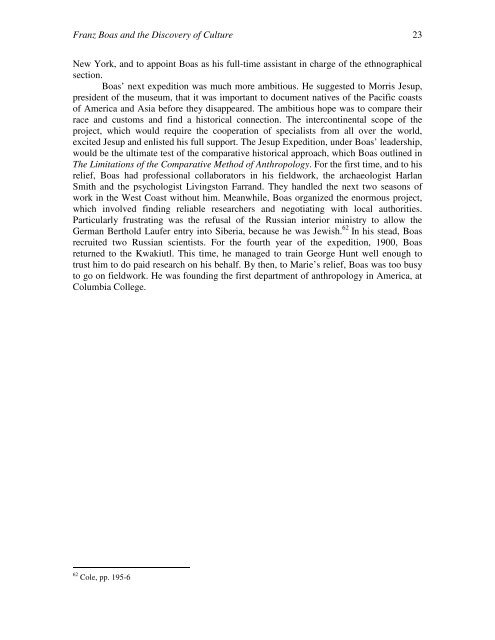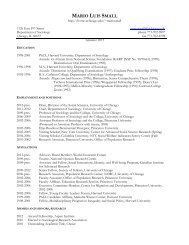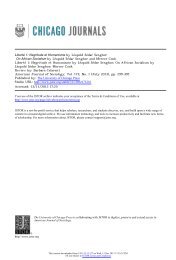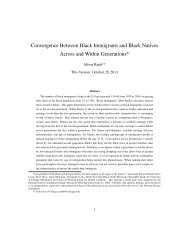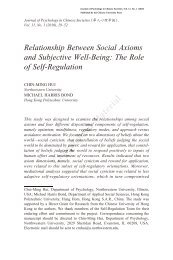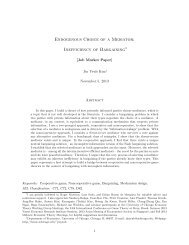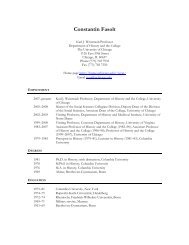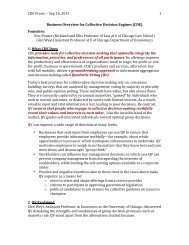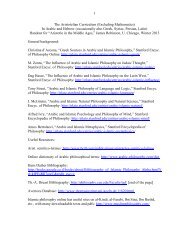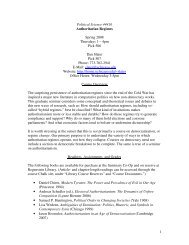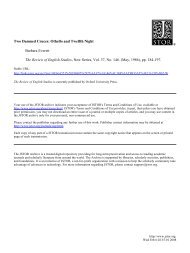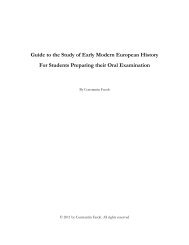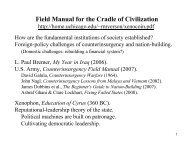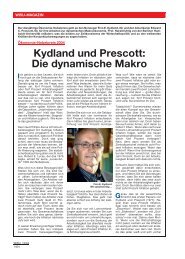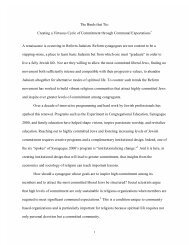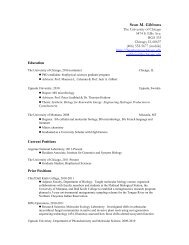Franz Boas and the Discovery of Culture - Personal Web Pages ...
Franz Boas and the Discovery of Culture - Personal Web Pages ...
Franz Boas and the Discovery of Culture - Personal Web Pages ...
Create successful ePaper yourself
Turn your PDF publications into a flip-book with our unique Google optimized e-Paper software.
<strong>Franz</strong> <strong>Boas</strong> <strong>and</strong> <strong>the</strong> <strong>Discovery</strong> <strong>of</strong> <strong>Culture</strong> 23<br />
New York, <strong>and</strong> to appoint <strong>Boas</strong> as his full-time assistant in charge <strong>of</strong> <strong>the</strong> ethnographical<br />
section.<br />
<strong>Boas</strong>’ next expedition was much more ambitious. He suggested to Morris Jesup,<br />
president <strong>of</strong> <strong>the</strong> museum, that it was important to document natives <strong>of</strong> <strong>the</strong> Pacific coasts<br />
<strong>of</strong> America <strong>and</strong> Asia before <strong>the</strong>y disappeared. The ambitious hope was to compare <strong>the</strong>ir<br />
race <strong>and</strong> customs <strong>and</strong> find a historical connection. The intercontinental scope <strong>of</strong> <strong>the</strong><br />
project, which would require <strong>the</strong> cooperation <strong>of</strong> specialists from all over <strong>the</strong> world,<br />
excited Jesup <strong>and</strong> enlisted his full support. The Jesup Expedition, under <strong>Boas</strong>’ leadership,<br />
would be <strong>the</strong> ultimate test <strong>of</strong> <strong>the</strong> comparative historical approach, which <strong>Boas</strong> outlined in<br />
The Limitations <strong>of</strong> <strong>the</strong> Comparative Method <strong>of</strong> Anthropology. For <strong>the</strong> first time, <strong>and</strong> to his<br />
relief, <strong>Boas</strong> had pr<strong>of</strong>essional collaborators in his fieldwork, <strong>the</strong> archaeologist Harlan<br />
Smith <strong>and</strong> <strong>the</strong> psychologist Livingston Farr<strong>and</strong>. They h<strong>and</strong>led <strong>the</strong> next two seasons <strong>of</strong><br />
work in <strong>the</strong> West Coast without him. Meanwhile, <strong>Boas</strong> organized <strong>the</strong> enormous project,<br />
which involved finding reliable researchers <strong>and</strong> negotiating with local authorities.<br />
Particularly frustrating was <strong>the</strong> refusal <strong>of</strong> <strong>the</strong> Russian interior ministry to allow <strong>the</strong><br />
German Berthold Laufer entry into Siberia, because he was Jewish. 62 In his stead, <strong>Boas</strong><br />
recruited two Russian scientists. For <strong>the</strong> fourth year <strong>of</strong> <strong>the</strong> expedition, 1900, <strong>Boas</strong><br />
returned to <strong>the</strong> Kwakiutl. This time, he managed to train George Hunt well enough to<br />
trust him to do paid research on his behalf. By <strong>the</strong>n, to Marie’s relief, <strong>Boas</strong> was too busy<br />
to go on fieldwork. He was founding <strong>the</strong> first department <strong>of</strong> anthropology in America, at<br />
Columbia College.<br />
62 Cole, pp. 195-6


